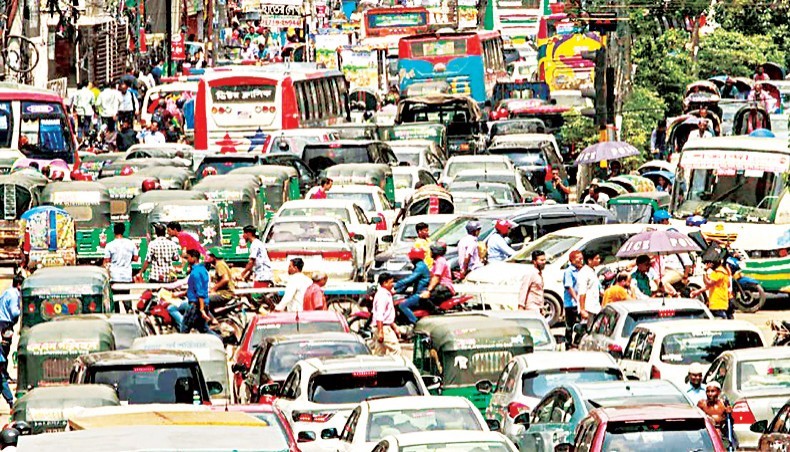
Traffic Jam in Dhaka: Navigating the Intersections of Health, Lifestyle, and Urbanization
Recently, the Bangla Tribune (a Bengali language news website of Bangladesh) spotlighted the intensifying transportation woes of Dhaka. Challenges rooted in poor public transport management have escalated daily traffic jams, affecting residents' well-being on multiple fronts—both physical and mental. Beyond the evident time wastage, the chronic stress and discomfort of daily commutes strain mental health, familial relationships, and life quality. The lingering effects range from health complications in stuffy buses to escalating commute expenses. Despite these adversities, the aspirations of Dhaka's citizens for improved infrastructure appear unmet.
Reflecting on this, my journey at the BRAC James P. Grant School of Public Health comes to mind. Over the span of 4 years and 1 month, from a Research Associate to an MPH student, then as a Senior Research Associate, I've experienced Dhaka's traffic firsthand. Living in Shyamoli and commuting to the ICDDR,B building, the daily congestion, especially post-7:30 AM, became a testament to the city's infrastructural challenges. These experiences were instrumental in my decision to prepare for the GRE.
The anecdotes are numerous and relatable. H. Halim highlights the work-life transition post commute; Firoz Ahmed, from Mirpur, describes truncated family moments; Rakib underscores the younger generation's aspiration for better work-life balance stifled by these commutes; while journalist Golam Mawla comments on the city's waning mental health and community spirit.
Dr. Shahaduz Zaman, back in 2010, remarked on the extremity of Dhaka's situation—how the city's unique chaos impacts personal relationships, often to a breaking point.
Given the aforementioned issues, there's a pressing need to delve deeper into the physical and mental health implications of traffic congestion, especially in Dhaka City. Previous studies have already shed light on the potential risks associated with prolonged commutes, suggesting that extended travel times might elevate the chances of depression, anxiety, and fatigue. Such revelations emphasize the gravity of the situation in densely populated urban areas like Dhaka, where daily commuting has become an arduous ordeal for many residents.
However, while global studies provide a foundation, it's crucial to have localized research tailored to the unique socio-economic and cultural dynamics of Bangladesh. This would offer insights more applicable to the Bangladeshi populace, enabling policymakers and health professionals to craft more effective, context-specific interventions.
The nexus between urban environments, specifically the infrastructural challenges they pose, and the health of their residents is becoming an increasingly critical area of study. The congested streets of Dhaka are not just markers of a city grappling with rapid urbanization but also indicators of the potential health toll on its inhabitants. Prolonged exposure to such conditions can lead to both physical and mental health challenges.
Physical ailments could arise from factors like increased pollution, leading to respiratory issues, or from the physiological strain of prolonged commutes in less-than-optimal conditions. On the mental health front, consistent exposure to such stressors can elevate risks of anxiety, depression, and other related conditions. Moreover, the overarching effect of these daily hurdles can indirectly influence social relationships, work productivity, and overall life satisfaction.
It's imperative that the research community pays due attention to these intertwined issues. While global studies offer a foundation, context-specific research grounded in the unique socio-economic and cultural landscape of Bangladesh is pivotal. Such localized studies can provide actionable insights tailored to the particular experiences of Dhaka's residents. By understanding the depth and breadth of these challenges, policymakers, urban planners, and health professionals can then design interventions that address the root causes and alleviate the compounded health impacts on the city's populace. The vast potential for impactful research in this field cannot be overstated, and its findings could shape a healthier, more sustainable urban future for Dhaka and similar cities globally.
(Photo courtesy: New Age)
Project Coordinator at Dhaka Shishu Hospital and Institute
6moI agrée! Post COVID situation is worst! It becomes a living hell which I am experiencing on daily basis while commuting from home to office!